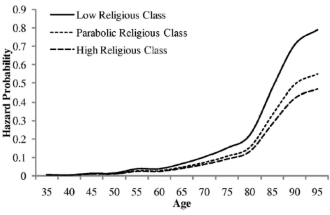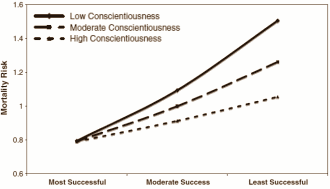|
Religion as a life-extender: more is better
Religious people live longer than people without religion, we wrote not so long ago. Today we read a study from 2009, in which American psychologists check whether it matters how important that religion is to people. Their research, which appeared in the Journal of Personality and Social Psychology, answered that question in the affirmative.
Study
Lead author of the study is Michael McCullough from the University of Miami. In 2000 he published a meta-study, in which he collected and re-analyzed the results of 42 previous studies. [Health Psychol. 2000 May;19(3):211-22.] The main outcome of McCullough's analysis was that religiosity reduced the mortality rate by 29 percent. That's a lot.
Does it matter how religious someone is? Thanks to the Terman Life Cycle Study of Children With High Ability, McCullough got the data which made it possible to answer that question. We have written about the Terman study before. You can find the article here.
McCullough had access to data from 1528 intelligent Californian men and women, all of whom had an IQ of at least 135. In 1940, they had answered a battery of questions about themselves and their religiosity, and were then followed until 2005. In that year, 1271 study participants had already died.
McCullough divided the study participants on the basis of their religiosity into 3 groups [Classes].


Results
The most religious study participants [Class 1] lived significantly longer than the study participants in Class 2 and Class 3. This relationship only applied to women. Why religion does not extend the life span of men, McCullough does not understand.

The most religious study participants [Class 1] differed on quite a few points from the least religious study participants [Class 2]. They drank less alcohol, were more socially active and also had an extraverted and social personality. These are all factors that extend the life span. If you take this into account, the connection between religion and longevity disappears.

Conclusion
It's possible to conclude from the study that not religion in itself has a life-prolonging effect, but that religious people more often have a healthy lifestyle - plus a personality structure that enables longevity.
But what if this healthy lifestyle and robust personality structure are also the result of religiosity?
Source:
J Pers Soc Psychol. 2009 Nov;97(5):866-82.
More:
Obituaries reveal the secret of a long life: religion 17.06.2018
Archives:
Psychology of Longevity
Psychology
Longevity
 |
 |
 |
|
Hard workers live longer
Men and women who work themselves to the bone in search of betterment are unlikely to live to an old age, and the stress of the commitments they impose on themselves reduces their life expectancy. Sounds logical, but the reverse is actually true.
|
Concentrating on positive feelings during adversity extends life expectancy
Psychological stress is unhealthy, and many scientific studies have shown that it also reduces life expectancy. At least, if you are unable to deal with it.
|
A life with a purpose lasts longer
Winning a competition. Conserving an area of nature. Bringing up your children. It doesn't matter what your purpose in life is, as long as you have one.
|
|








